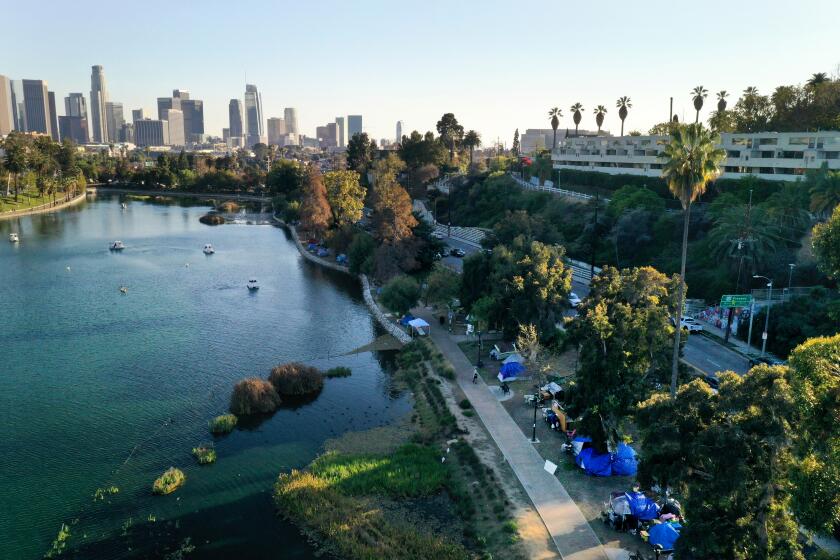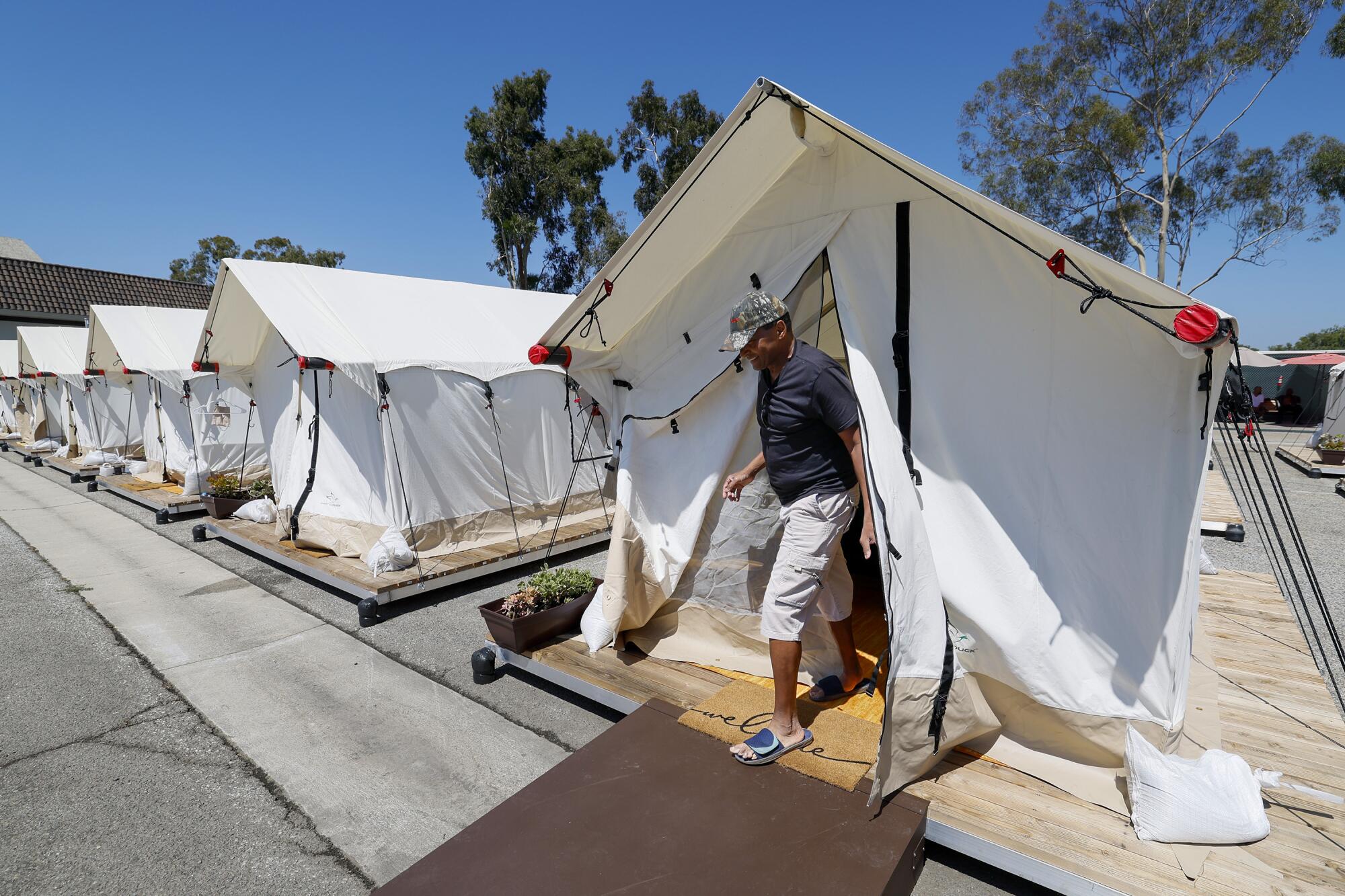
- Share via
The rows of white canvas cabin tents newly erected in an out-of-the-way quarter of Culver City, along the bank of Ballona Creek, have the ambiance of an Army field base.
Miles to the east in South Los Angeles, more modest camping tents — like one might buy at a sporting goods store — line the parking lot of the shuttered Lincoln Theater, evoking something more like a Boy Scout jamboree.
Though dissimilar in style, the two tent villages have a common purpose: They’re the easiest step from the deprivations and hazards of the street to a place where meals are served three times daily and guards are on duty around the clock.
The camps are managed by Urban Alchemy, the San Francisco-based nonprofit that has rapidly grown into a multimillion-dollar street services enterprise and embodies an elastic philosophy of shelter. Urban Alchemy calls them safe sleep villages.
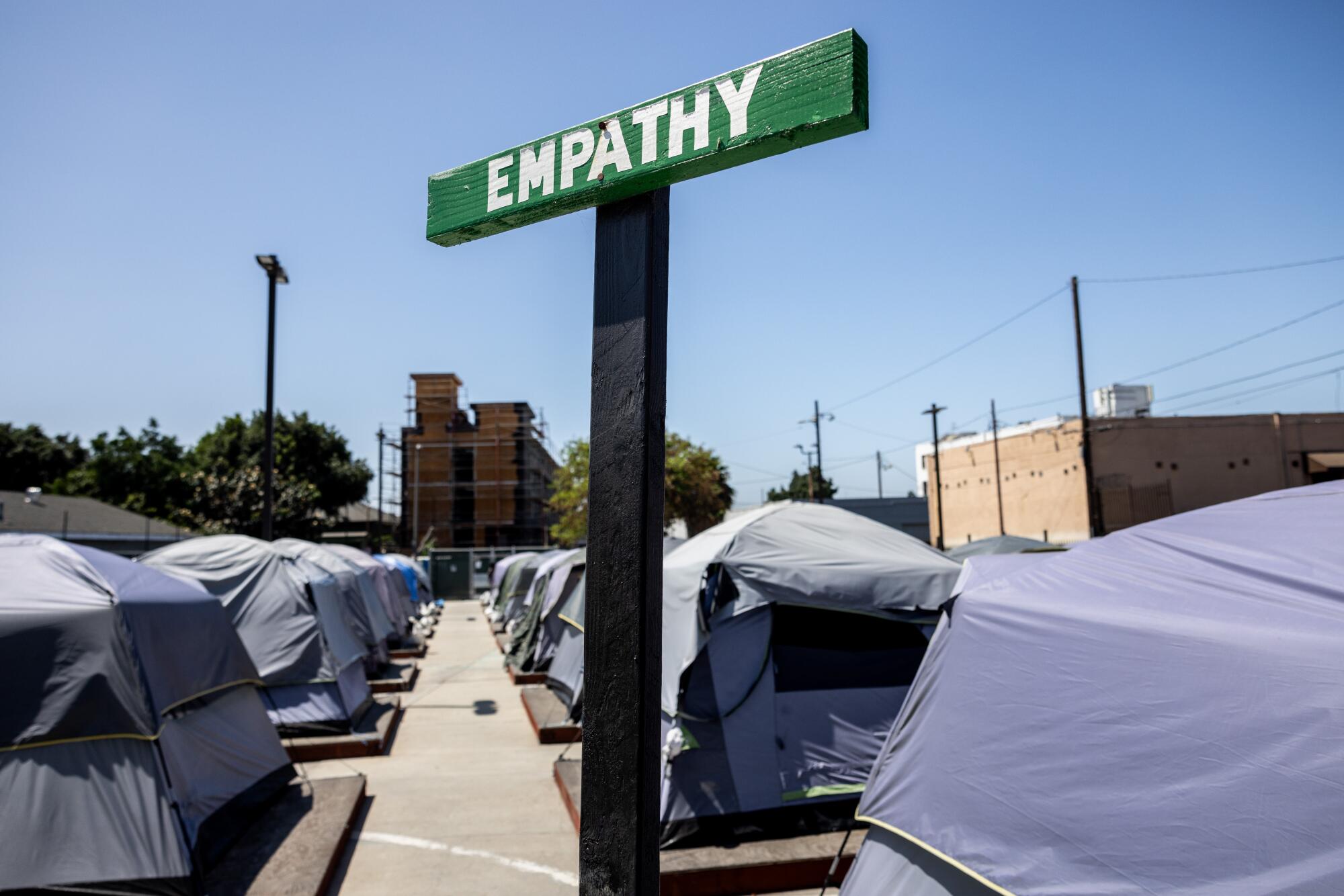
While some homeless advocates regard the tiny home cabins that have sprouted by the hundreds across Los Angeles as the minimum acceptable form of shelter, Urban Alchemy views tents as a way to create shelter quickly and cheaply without compromising the benefits most valued by people accustomed to living on the street — privacy, nourishment, security and a sense of autonomy.
“Our philosophy is that we should have a multitude of options for our unhoused residents,” said Kirkpatrick Tyler, the nonprofit’s chief of government-community affairs. “What we found in the early iterations of safe sleep is that some people preferred tents because it gave them a sense of ownership.”
Tents also “allowed them to keep the familiar environment that was around them but still do that in a place where they were safe, supported and not being victimized by drug dealers or abusers or loan sharks or all of the people that kind of prey on unhoused populations,” he said.
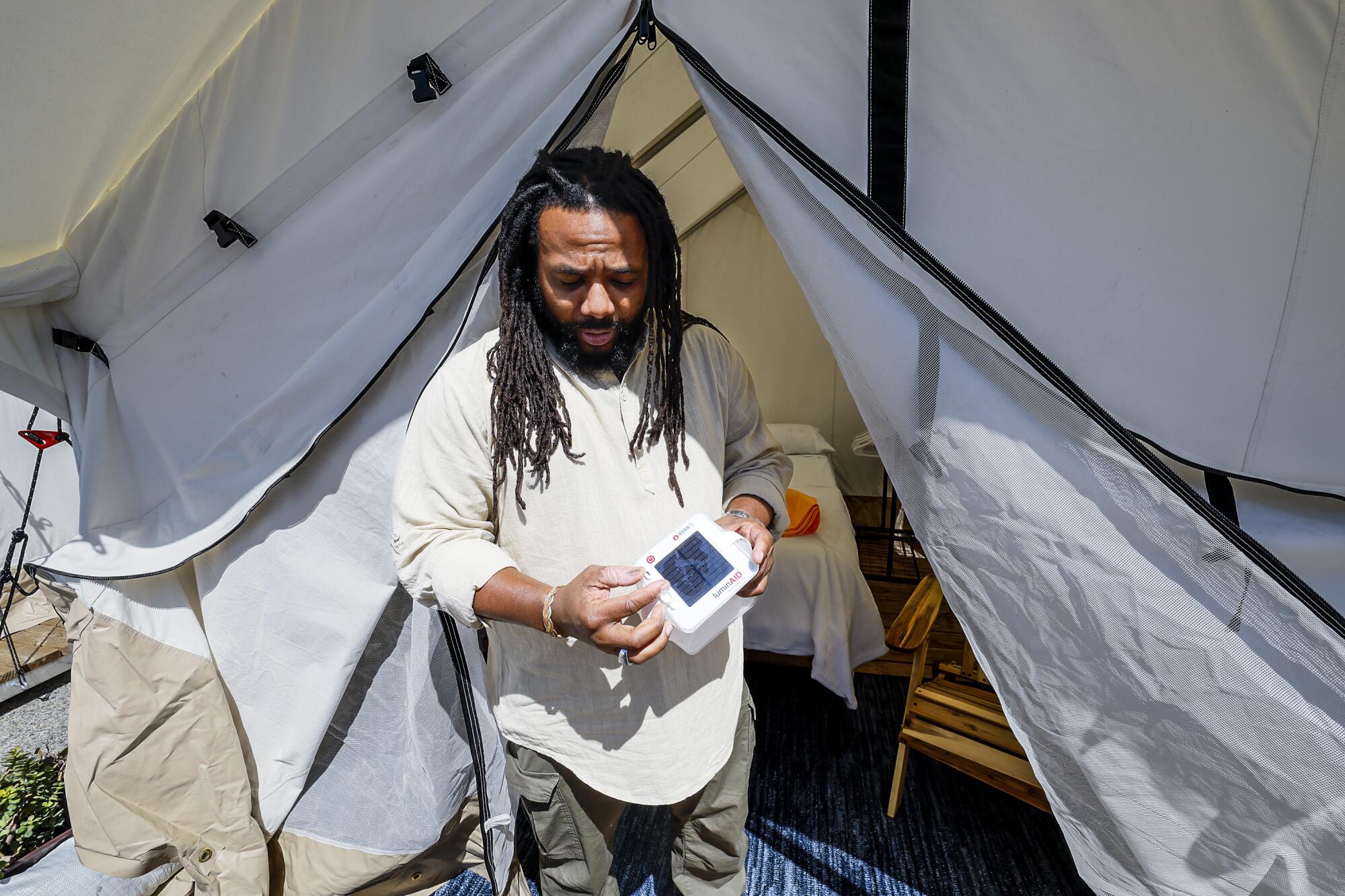
Starting with a $35,983 grant in 2018 to maintain the city’s public toilets, Urban Alchemy founder Lena Miller defined its mission as social alchemy to transform the ills of street life by establishing “safety and cleanliness.” It fielded a streetwise staff — at first made up primarily of former prisoners — who had the “ability to read people in unpredictable situations.”
Aggressive marketing aligned with rising public discontent over homelessness made for a winning strategy. By 2021 it reported $51 million in revenue primarily from contracts for street outreach and shelter operations in San Francisco; Austin, Texas; Portland, Ore.; and Los Angeles.
The yellow-striped black jackets of Urban Alchemy “ambassadors” have become a common sight around Los Angeles courtesy of contracts with the city and individual council offices to provide outreach to homeless communities from Echo Park to Venice.
A homeless encampment at Echo Park Lake has become a symbolically fraught case study of the rights to public spaces
The organization’s rapid growth has raised issues over the training and conduct of its ambassadors or “practitioners,” some of whom have been accused in lawsuits of abusive behavior. More broadly, critics portray Urban Alchemy as a nonprofit surrogate for police who let it take the lead in clearing unpopular homeless encampments.
Los Angeles officials generally profess satisfaction with its work, which first drew notice in the 2021 removal of a large homeless encampment from Echo Park, when ambassadors worked alongside outreach workers from other agencies urging people to accept offers of shelter.
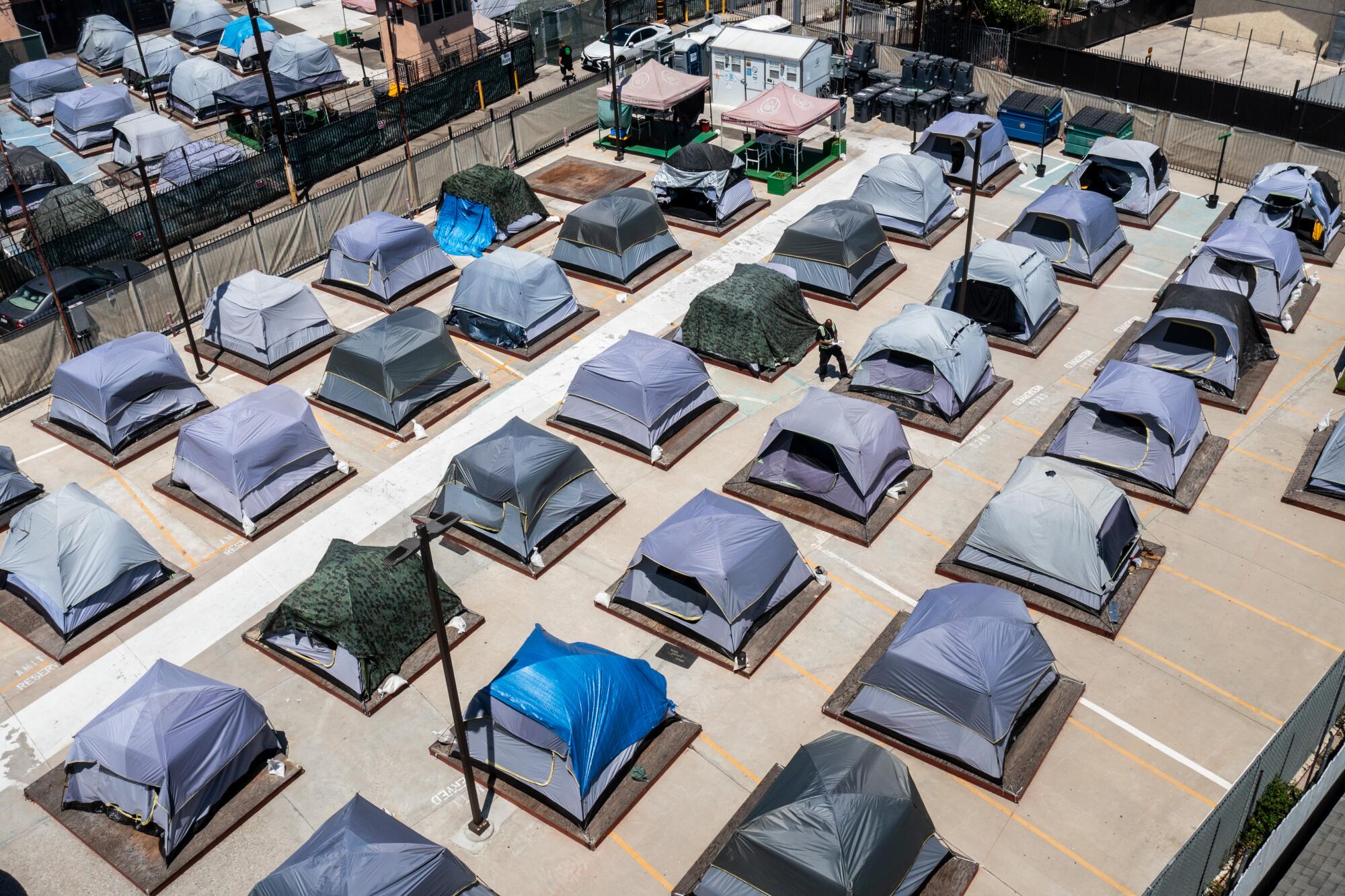
Later that year, the city hired Urban Alchemy to staff then-Mayor Eric Garcetti’s CIRCLE program, which diverts 911 calls dealing with homeless people “under the influence of alcohol or drugs, or who are wandering the streets without clothes, causing noise or loitering.”
Urban Alchemy’s first safe sleep village was an open space in San Francisco where the nonprofit provided bathroom facilities, security and services to people who pitched their own tents.
It brought an upgraded version to Los Angeles in 2021 when then-Councilman Mitch O’Farrell was seeking an alternative for people who were being forced from Echo Park and didn’t want the first option, a room in the L.A. Grand Hotel in downtown. The organization provided the tents, which were tethered to the asphalt of an East Hollywood parking lot slated for development of affordable housing.
It closed in December of 2021 when construction began.
Los Angeles City Councilman Curren Price saw a similar opportunity when the nonprofit Coalition for Responsible Community Development used state Project Homekey funds to purchase the architecturally flamboyant Lincoln Theater on South Central Avenue, a historic venue where leading African American performers including Duke Ellington and Billie Holiday appeared in the mid-20th century.
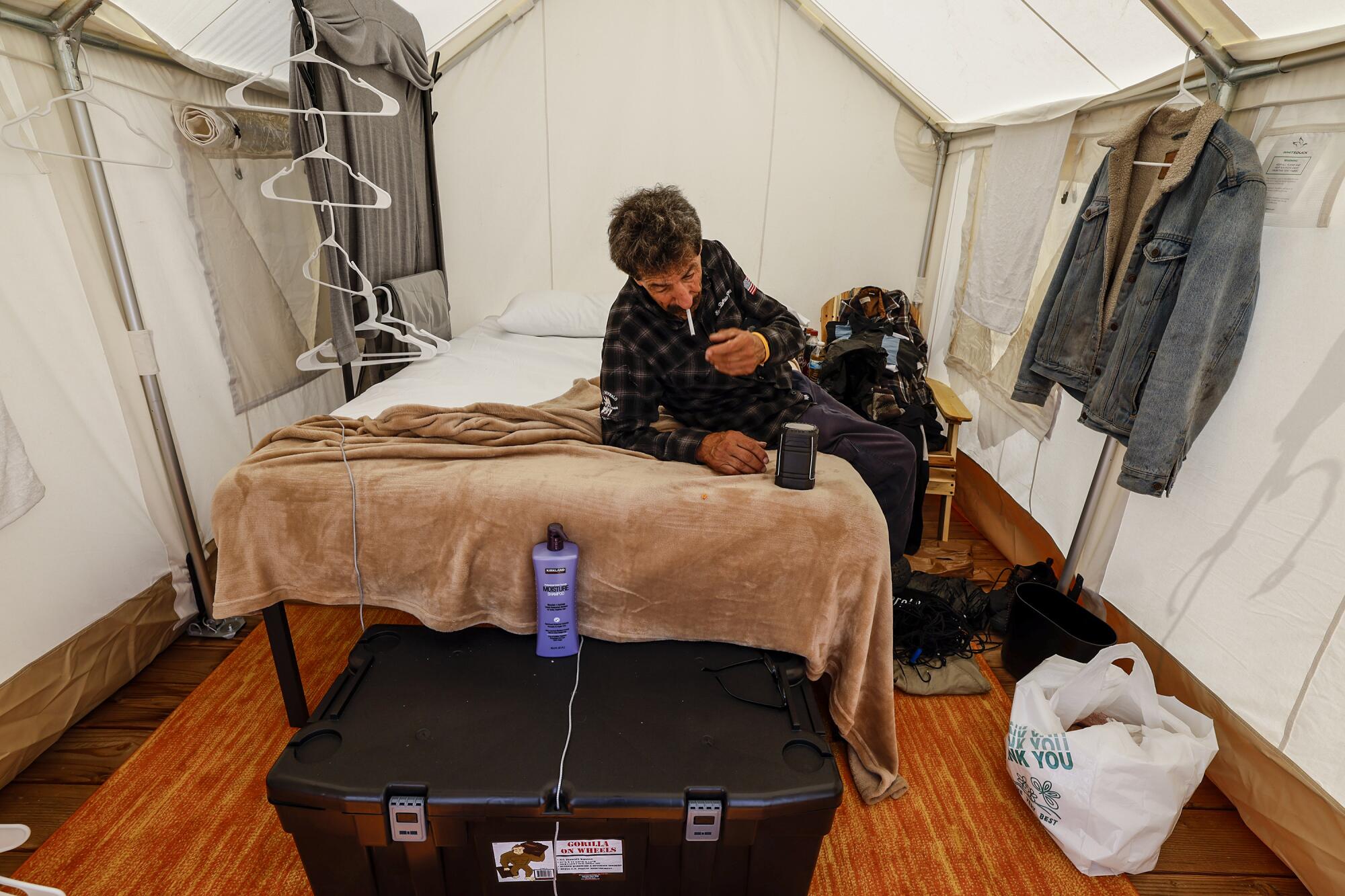
Plans to build 59 units of affordable housing on the parking lot next to the theater would take years to materialize, leaving a window for temporary use.
Price’s deputy chief of staff James Westbrooks said the office was searching for an interim housing site and wanted something different from the traditional large building filled with bunk beds.
After visiting the East Hollywood site, the councilman decided to duplicate the San Francisco model, Westbrooks said. Speed was more a factor than cost. At $4 million for preparing the site, much of it for fencing, bathrooms and staff facilities, the cost was less than the city spends on tiny homes but still about $44,000 per tent. In addition to that, the village has an operating budget of $3 million annually, mostly for 24-hour staffing and meals catered by Everytable.
This time the tents — larger than pup tents but not tall enough to stand in — were secured on wooden platforms to raise them above the asphalt.
The shelter opened in February of 2022 and has been continuously at close to capacity, said Tyler of Urban Alchemy. Only two spaces were available the day The Times visited in August.
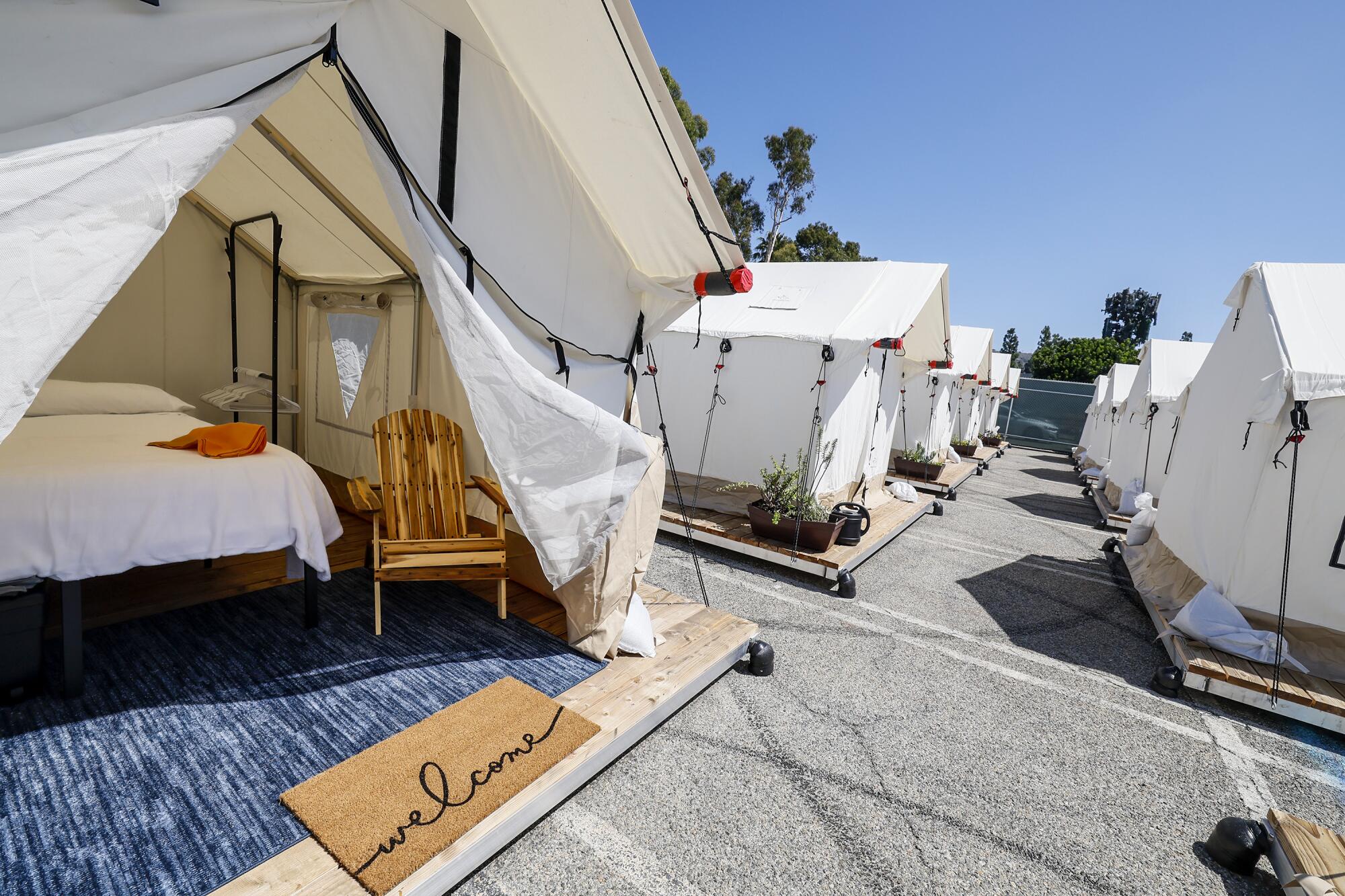
Westbrooks said the proposal faced some community opposition but was sold on the promise that Urban Alchemy would do outreach to recruit people living in encampments in the neighborhood.
“Right now, people are fine with it,” Westbrooks said.
Nearby merchants had mixed reactions.
Linda Mora, manager of a check cashing business, said residents of the camp were causing chaos.
“They come in, they yell, they scream,” said Mora, echoing several other shop workers on a section of Central Avenue where city trash cans were overflowing and several people lay or sat on the sidewalk or in alleys. “People don’t feel safe inside.”
Mora said customers had complained of being robbed as they left.
A few doors down, Heidi Carrillo said that the foot clinic she manages had experienced no such problems, and that it would be hard to say that anyone causing trouble was a resident at the shelter.
“There is no way to know,” she said. “This is a bad area, period.”
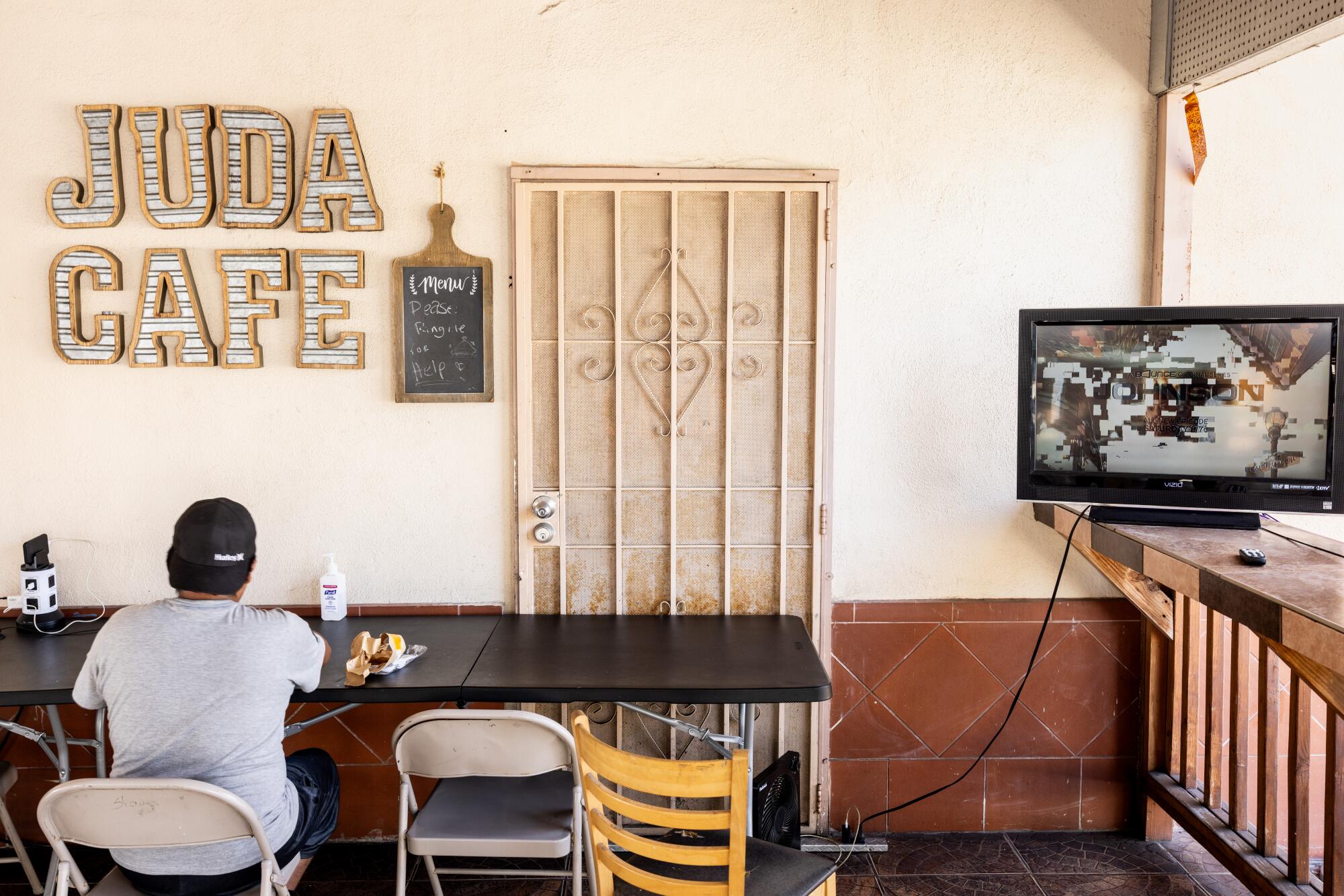
Monica Jauregui, who manages Bowers and Sons cleaners, said issues with the shelter population had cooled down after security was beefed up and the Coalition for Responsible Community Development opened an office across the street and began offering workforce training and other services.
Urban Alchemy is light on rules. There are no drug checks and no curfew, but drug use is prohibited in common areas. Welfare checks occur on the hour, deputy director of operations Kenon Joseph said.
The precept that shelter should be a short step — usually 60 to 120 days — on the way to permanent housing is interpreted loosely.
Guests, as Urban Alchemy calls its clients, are there to gain safety and stability and to transition at their own pace. To date, only about 2% have moved on to permanent housing.
“We can’t tell folks that they got to find somewhere because we know now that we don’t have adequate affordable housing for every segment of our population,” Tyler said.
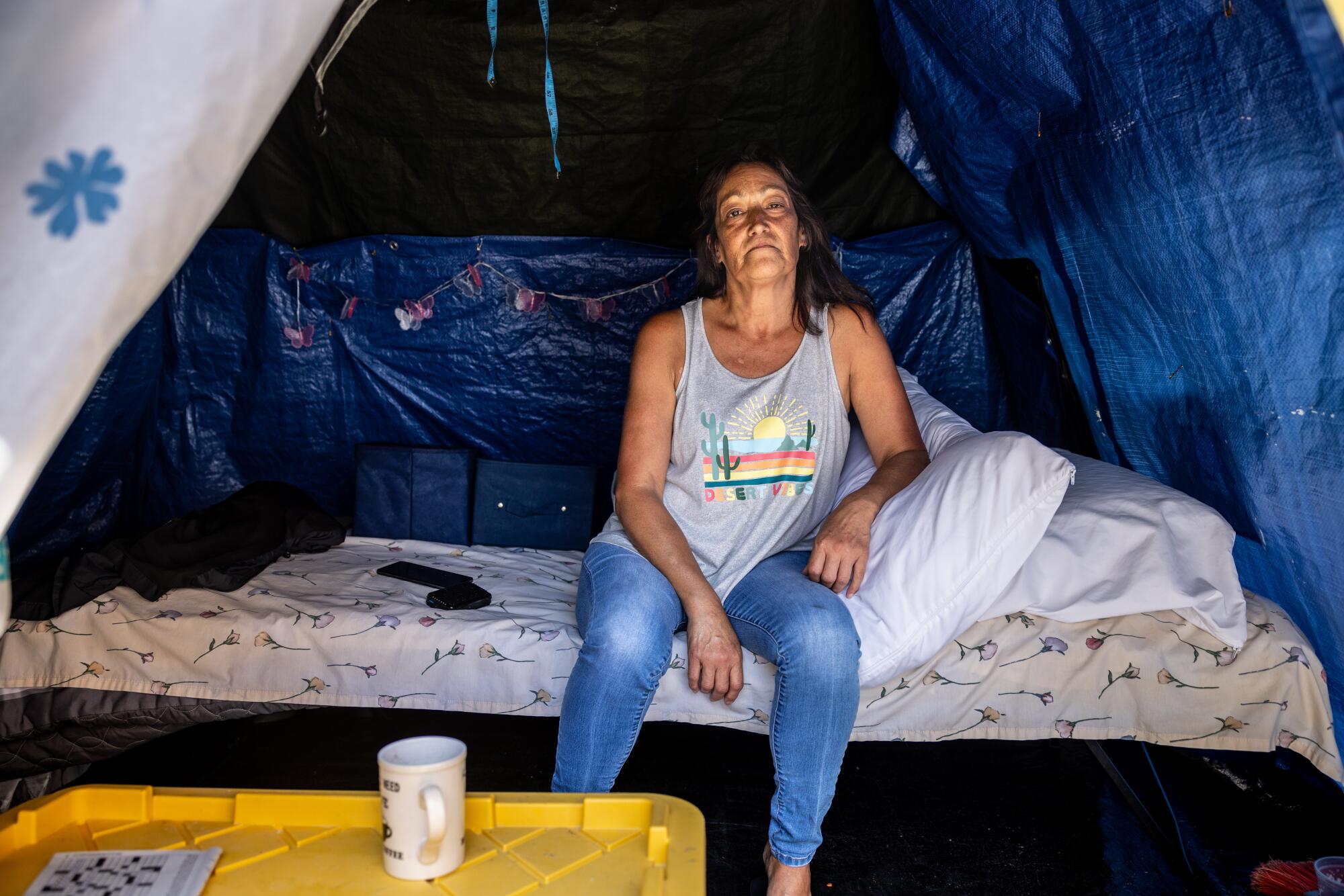
Dolores Flores is one of the shelter’s long-termers. She’s also a returnee, having moved out once to pursue a fling that didn’t work out.
“I tend to rush into things that never work out,” she said.
Her current stay has been 11 months. Sitting at a picnic table in the shade of large trees that grace the most desirable corner of the village, Flores said she’s in no hurry to move on.
“I don’t want to be rushed out of here and then find out I wasn’t ready for that,” she said.
She has difficulty managing racing thoughts, is not particularly social and has few needs, she said.
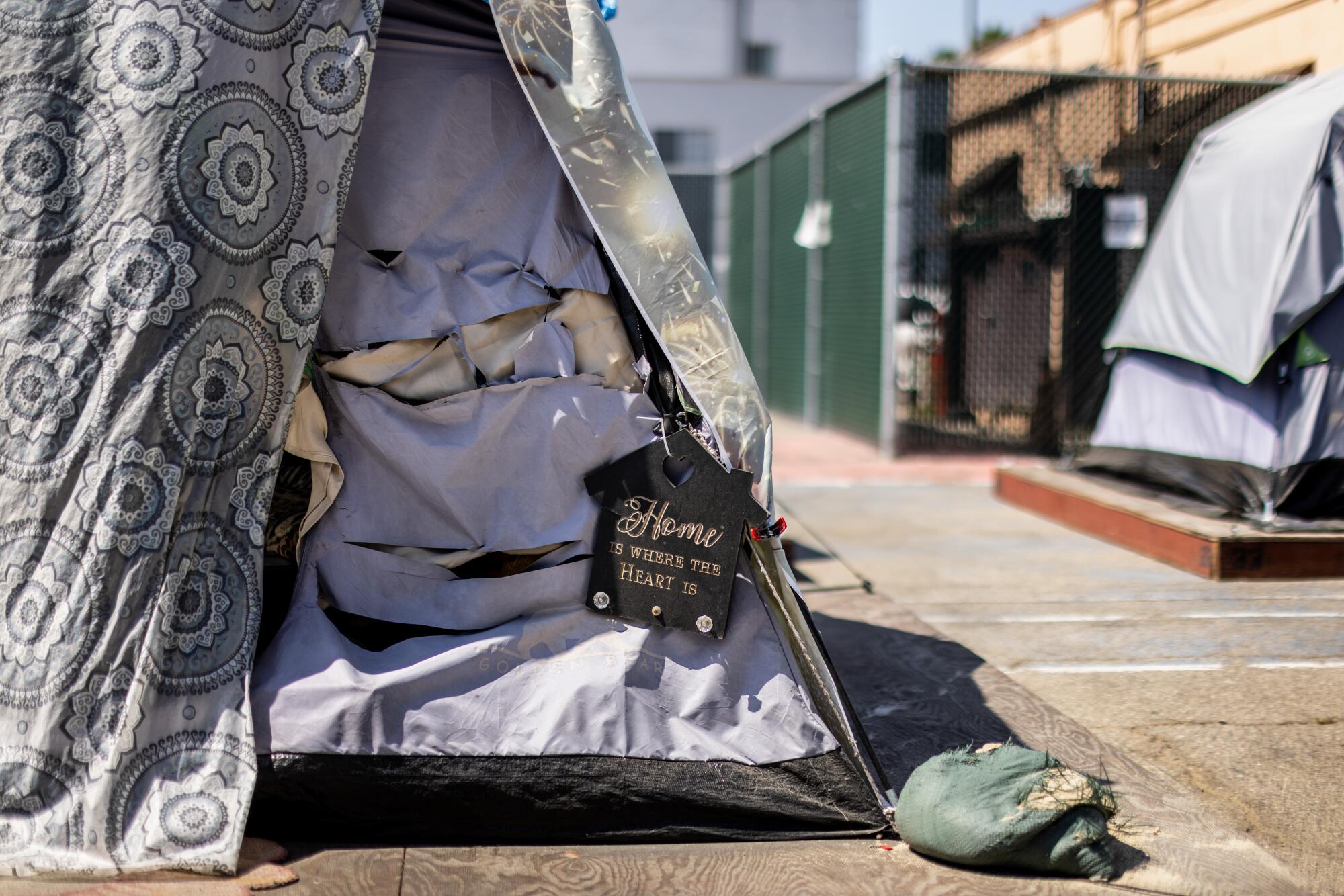
The tent provides her everything she had on the street without the stress and volatile neighbors.
Still, she will have to leave eventually when the Coalition for Responsible Community Development claims the land to start construction.
That’s another part of the rationale for low-investment tent shelters. Like the jamboree it resembles, the Lincoln shelter can be taken down in short order and moved somewhere else if it’s still needed.
Tyler characterized the Lincoln site as just one iteration of an ongoing development of safe sleeping that reached a new level in Culver City.
After the Los Angeles Homeless Services Authority’s 2022 count of 350 unhoused people in the city, the City Council launched a response that included buying two motels and leasing rooms in other motels as a temporary measure, said Tevis Barnes, the city’s housing and human services director.
The decision to add a safe sleeping site was based on both speed and cost, Barnes said. “You can pop up safe sleep faster.”
And it turned out that some people preferred tents.
“For people not ready to come inside yet, Homekey and the motel model does not work for them,” Barnes said.
The city visited the Lincoln site and liked what Urban Alchemy was doing, Barnes said. “We liked the idea a large majority of UA staff were people who had been unhoused.”
They were not so thrilled with the tents.
“They were like REI, the kids camp in the backyard,” she said. “People kind of had to crawl into them — not good for people with mobility issues. It’s not very dignified.”
They settled on a White Duck 8-by-10-foot canvas walk-in tent with room for a full bed and chair.
“I think we tried to put together something nice,” Barnes said.
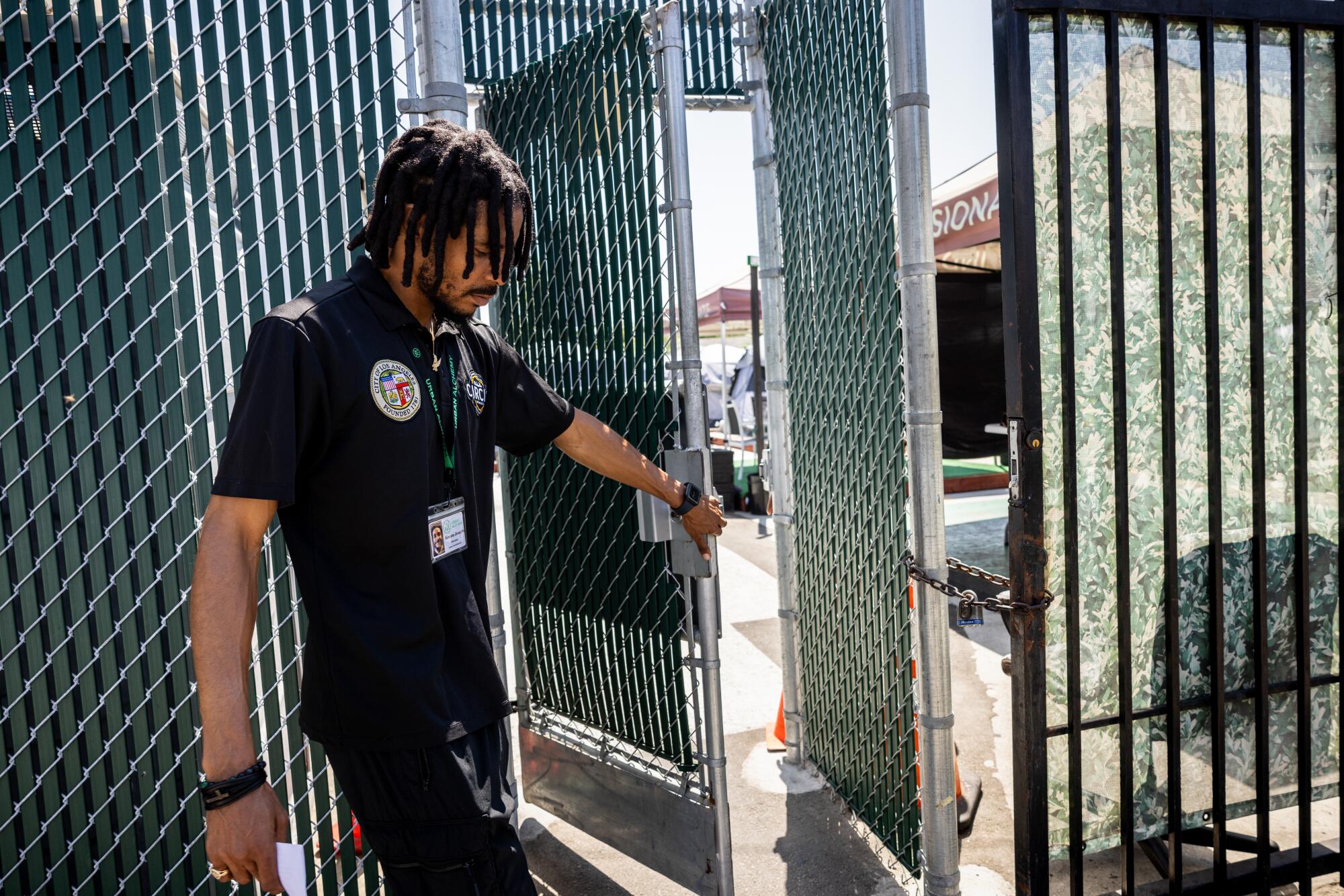
Jerry Washington, one of the first guests enrolled when the shelter opened Aug. 15, had been sleeping for years in the paddle tennis courts in Fox Hills Park. During the day before he left, he would secure a lounge chair with lock and chain inside the courts. With a mobile phone and a gym membership paid by General Relief, he was doing fine.
But after years of dodging the park director, imposing on relatives to sleep at their homes and getting nowhere on his plans for an acting career, he decided to apply to the Housing Department for something better. Months of feelers with his outreach worker from St. Joseph Center led to an offer of a tent.
It was an easy call. Still trim at 65, Washington is now rested, well-fed and free to pursue his dream, a short distance away at Fox Studios.
“I’d like to get an entry level position, sports, movies and TV,” he said. “I love to talk about sports. Try to get a position where I can get a job being on a sports show. Get an audition for a TV show or a movie.
“I don’t want a job. Anybody can have a job. I want a career.”
More to Read
Sign up for Essential California
The most important California stories and recommendations in your inbox every morning.
You may occasionally receive promotional content from the Los Angeles Times.

